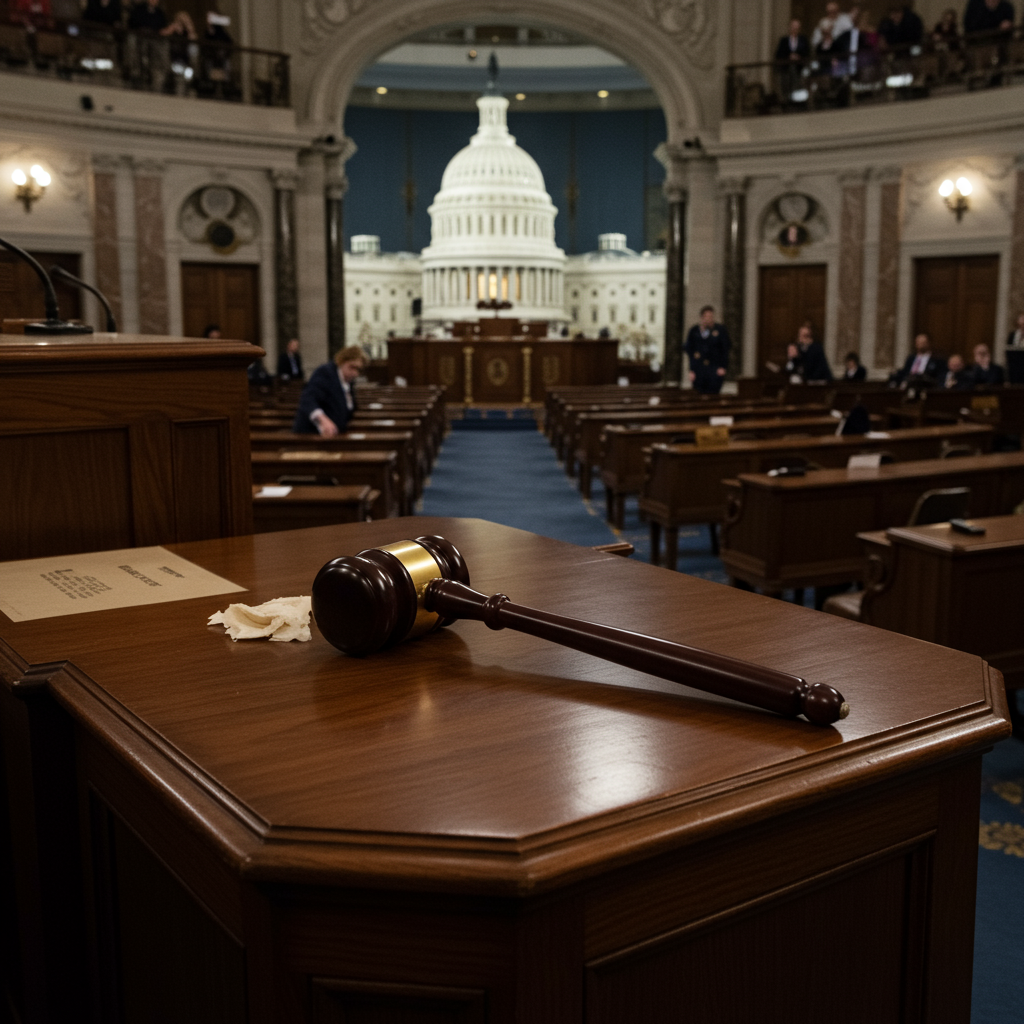A fierce political standoff over the release of Jeffrey Epstein-related government files has abruptly cut short the House of Representatives’ legislative session, forcing an early summer recess. This unprecedented move highlights deep divisions within the Republican Party and intense pressure for transparency surrounding the late convicted sex offender. As Washington grapples with the fallout, key lawmakers clash over process and political timing, leaving critical legislation in limbo and fueling public demands for full disclosure.
The Unprecedented House Stand-off
The U.S. House of Representatives unexpectedly concluded its final workweek, adjourning for its month-long summer recess days ahead of schedule in late July 2025. This early departure, initially unforeseen by many, directly stemmed from an intense internal conflict regarding the public release of documents tied to Jeffrey Epstein. What began as procedural wrangling quickly escalated into a full-blown political crisis, sidelining routine legislative work.
Rules Committee Deadlock: How Procedure Halted Progress
The immediate catalyst for the House’s early recess was a critical deadlock in the House Rules Committee. This powerful panel, typically responsible for setting the terms for legislative debate and floor votes, found itself paralyzed. Democrats on the committee had vowed to introduce a flurry of amendments linked to the Epstein issue, aiming to force potentially “uncomfortable votes” on Republican members. These amendments sought to compel the Trump administration to release all remaining Epstein files immediately. To circumvent these politically charged votes, Republican leaders made the strategic decision to recess the committee for the remainder of the week. This move effectively halted the passage of new legislation requiring a simple majority, disrupting the normal flow of the legislative calendar and making further votes impractical after Wednesday.
Speaker Johnson’s Frustration and Blame Game
Speaker Mike Johnson, R-La., expressed palpable frustration over the situation, particularly directing his ire at fellow Republican Rep. Thomas Massie of Kentucky. Johnson publicly criticized the tactics, accusing Democrats of engaging in “political games” and creating “side shows” that distract from the “America First agenda.” He adamantly stated he would not permit the Epstein issue to be leveraged as a “political battering ram” within the Rules Committee, confirming that no vote on any Epstein resolution would occur before the August recess. Johnson’s justification was that “there’s no purpose for Congress to push an administration to do something that they’re already doing,” referencing the Justice Department’s recent moves under President Trump’s directive. Despite his public stance, reports indicate Johnson privately acknowledged the administration’s push for transparency while emphasizing the need to protect victims’ identities and resist Democratic political posturing.
The Epstein Files: A Lingering Shadow on Capitol Hill
The Jeffrey Epstein saga has dominated conversations on Capitol Hill for weeks, casting a long shadow over legislative affairs. Public clamor for the release of all documents related to the convicted sex offender and his network has intensified, particularly from segments of the Trump administration’s MAGA base. This persistent demand has kept the issue at the forefront, creating a challenging environment for congressional leadership.
Constituent Pressure and MAGA Base Demands
Lawmakers across the aisle report receiving an overwhelming volume of calls from constituents demanding more information and full transparency regarding the Epstein files. Rep. Marjorie Taylor Greene, R-Ga., a vocal proponent for the release of the files, noted that in the preceding week, the vast majority of calls to her congressional office were “all about Epstein.” This strong public pressure, particularly from a key Republican demographic, has put significant strain on GOP leadership, who find themselves caught between managing legislative procedure and appeasing an agitated base seeking answers.
Ghislaine Maxwell: A Renewed Focus
The controversy gained renewed momentum following a critical development involving Epstein’s associate, Ghislaine Maxwell. The Justice Department announced that Deputy Attorney General Todd Blanche would meet with Maxwell “in the coming days” to determine if she possessed information about “anyone who has committed crimes against victims.” This outreach marks a significant step, as it’s reportedly the first time an administration has formally inquired about her willingness to speak with the government since her conviction. Shortly after this announcement, Rep. Tim Burchett, R-Tenn., successfully moved in a House Oversight Committee subcommittee meeting to issue a subpoena for Maxwell’s deposition. Oversight Chairman James Comer, R-Ky., encouraged this motion, indicating the subpoena would be issued “as expeditiously as possible,” signaling a determined effort to glean new information.
Internal Republican Rift: Massie vs. Johnson
At the heart of the congressional gridlock lies a palpable internal rift within the Republican caucus, particularly between Speaker Mike Johnson and Rep. Thomas Massie. While both claim to support transparency, their approaches and political timing are starkly at odds, creating a public spectacle and legislative impasse.
The Discharge Petition: Massie’s Path to Transparency
Rep. Thomas Massie, R-Ky., has emerged as a leading figure pushing for immediate and full disclosure. Collaborating with Rep. Ro Khanna, D-Calif., Massie introduced the “Epstein Files Transparency Act,” a bill designed to legally compel the Justice Department to release all Epstein-related files within 30 days. Recognizing Speaker Johnson’s unwillingness to bring his bill to a floor vote, Massie initiated a discharge petition. This rarely used but powerful procedural mechanism allows a bill to bypass leadership and be brought directly to a vote on the House floor, provided it garners the signatures of at least 218 House members (a simple majority). Massie has confidently asserted he already has the necessary support from Democrats and “at least a dozen Republicans.” However, House rules require a “ripening” period of seven legislative days for a discharge petition, meaning any potential vote on Massie’s bill would be delayed until after Congress reconvenes in September.
Johnson’s Public Rebuke of a Fellow Republican
Speaker Johnson’s frustration with Massie reached an unusual public crescendo. In a lengthy tirade, Johnson questioned Massie’s motivation, accusing him of trying to “inflict political pain on his own teammates.” Johnson highlighted that Massie could have pursued a discharge petition anytime during the previous four years of the Biden administration, raising suspicions about his timing, particularly choosing the period leading up to President Trump’s election. While generally adhering to Ronald Reagan’s “11th Commandment” – never speak evil of another Republican – Johnson made an exception, stating, “My gosh, it’s hard to do sometimes around here.” This public dressing-down underscored the deep personal and ideological chasms developing within the GOP over the handling of this politically charged issue.
DOJ and Trump Administration’s Role
Amidst the congressional turmoil, the Trump administration and the Department of Justice (DOJ) have taken steps that both align with and complicate the calls for transparency. President Trump’s stance has been multifaceted, navigating public pressure while simultaneously deflecting criticism and launching counter-accusations.
DOJ’s Move to Unseal & Maxwell Outreach
The Justice Department, acting under President Trump’s direction, formally requested a federal judge to unseal transcripts from Epstein’s grand jury proceedings. Deputy Attorney General Todd Blanche confirmed the DOJ’s outreach to Ghislaine Maxwell’s legal team, signaling a potential new phase in the Epstein investigation. Maxwell’s attorney, David Oscar Markus, corroborated these discussions, affirming Maxwell’s willingness to “always testify truthfully.” These actions are presented by the administration as proof of their commitment to uncovering the truth and releasing information. However, they also come amidst significant public and political pressure, suggesting a reactive element to their timing.
Trump’s Counter-Narrative and Political Attacks
Facing pressure from his base and lawmakers over perceived inaction on the Epstein files, President Trump has actively sought to control the narrative. He dismissed any Epstein-related documents implicating him as part of a “witch hunt,” a familiar tactic from previous investigations. Furthermore, Trump escalated his rhetoric by accusing former President Barack Obama of “treason,” also naming former FBI Director James Comey and former CIA Director John Brennan. He even shared AI-generated videos depicting Obama’s arrest. This offensive was fueled by new criminal referrals from Director of National Intelligence Tulsi Gabbard, alleging a “treasonous conspiracy” by Obama-era officials to sabotage Trump’s presidency—claims that have been contradicted by prior investigations. This strategy aims to divert attention and galvanize his base, reframing the Epstein controversy as another instance of political adversaries targeting him.
What Lies Ahead: The September Showdown
Despite the House’s early recess, the fight over the Epstein files is far from over. Rep. Massie, outwardly relishing the scrutiny, was spotted carrying a binder labeled “The Epstein Files: Phase 2 … DECLASSIFIED,” projecting confidence. He believes momentum for transparency will build over the August recess. Massie is optimistic that he and Rep. Khanna will secure the necessary 218 signatures for their discharge petition, predicting a successful vote in September. He anticipates that “every Democrat and at least a dozen Republicans who want transparency and justice” will support the measure, leading to the release of “Phase 2 of the Epstein files.” This indicates a likely showdown once lawmakers return, with the issue poised to continue dominating the political landscape.
The Broader Implications for Government Transparency
The congressional battle over the Epstein files transcends simple legislative procedure; it highlights a critical tension in government transparency. While leaders often cite victim protection and ongoing processes as reasons for caution, the public’s demand for full disclosure of such a high-profile, sensitive case is a powerful force. This standoff underscores the public’s declining trust in institutions and their increasing desire for accountability, particularly when dealing with powerful figures. The use of procedural maneuvers like the discharge petition reflects a growing willingness among some lawmakers to bypass traditional leadership and directly engage with issues they perceive as critical to public interest and trust, even if it creates internal party strife. The outcome of this fight will not only determine the fate of the Epstein files but also set a precedent for how Congress navigates similar demands for transparency in an increasingly polarized political environment.
Frequently Asked Questions
What exactly led the House to recess early due to the Epstein files?
The House canceled its final scheduled votes and recessed early in late July 2025 because of a procedural deadlock in the House Rules Committee. Democrats threatened to introduce multiple amendments requiring votes on the release of Jeffrey Epstein-related files. To avoid these politically charged votes, Republican leaders decided to recess the committee, effectively halting the legislative process for the week and making further floor votes impossible after Wednesday. This maneuver was a direct response to a bipartisan push for immediate transparency on the Epstein files.
How can legislation like the “Epstein Files Transparency Act” bypass leadership for a vote?
Legislation, such as Rep. Thomas Massie’s “Epstein Files Transparency Act,” can bypass House leadership and be brought directly to a floor vote through a discharge petition. This procedural mechanism requires the signatures of a majority of House members (218 out of 435). Once the necessary signatures are collected, the petition must undergo a “ripening” period of seven legislative days before the bill can be considered for a vote. This process allows determined lawmakers to force a vote on measures that leadership might otherwise block.
What are the differing stances within the Republican party regarding the Epstein files’ release?
Within the Republican party, there’s a significant division. Speaker Mike Johnson and GOP leadership prefer a more controlled release process, asserting that the Justice Department is already working to unseal files under President Trump’s direction and cautioning against “political games” that could jeopardize victims’ identities. Conversely, Rep. Thomas Massie, supported by figures like Rep. Marjorie Taylor Greene and a faction of the MAGA base, advocates for the immediate and full public release of all files, pushing for a direct House vote via a discharge petition to compel the DOJ. This creates a visible rift, with Massie criticizing Johnson for obstructing transparency.
References
- www.nbcnews.com
- www.cbsnews.com
- <a href="https://www.theguardian.com/us-news/live/2025/jul/22/trump-epstein-mike-johnson-congress-vote-politics-latest-updates?CMP=sharebtnurl&page=with%3Ablock-687f759a8f0836339f23b80e”>www.theguardian.com
- www.scrippsnews.com
- www.newsweek.com



